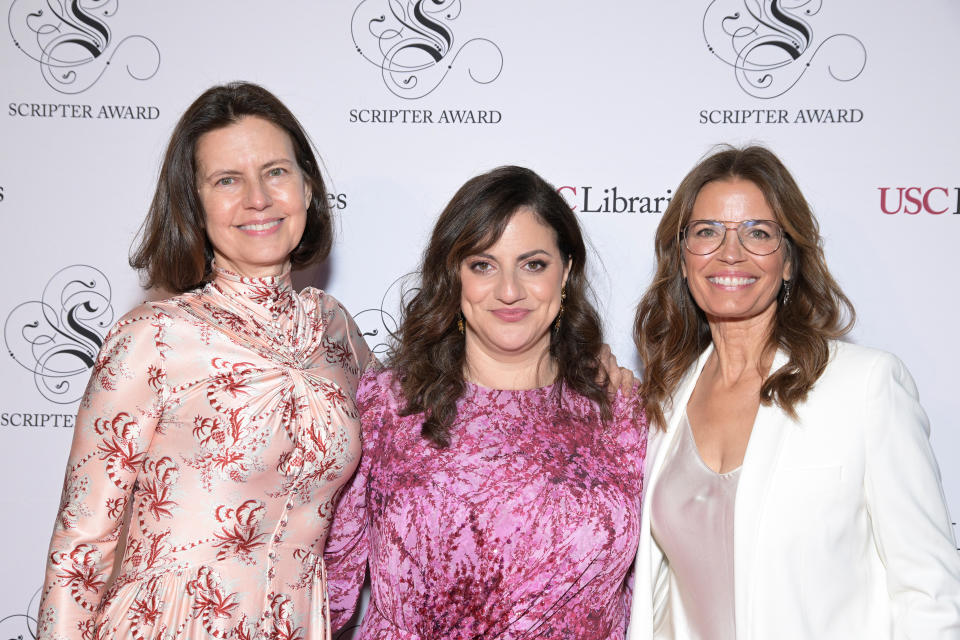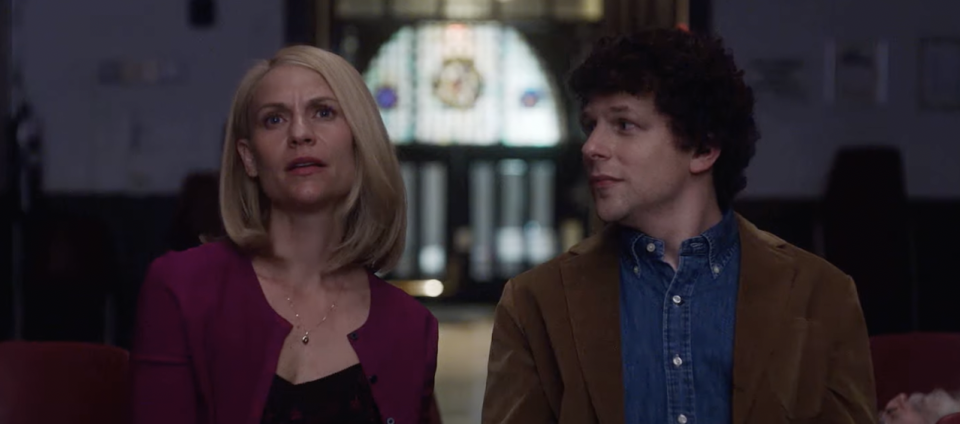‘Fleishman Is in Trouble’ Caught on Like ‘The Ring’

- Oops!Something went wrong.Please try again later.
- Oops!Something went wrong.Please try again later.
Editor’s Note: This interview was coordinated with Taffy Brodesser-Akner directly, in accordance with the rules of the Writers Guild of America strike, which began on May 2.
Welcome to It’s a Hit! In this series, IndieWire speaks to creators and showrunners behind a few of our favorite television programs about the moment they realized their show was breaking big.
More from IndieWire
2023 Emmys Predictions: Outstanding Lead Actress in a Limited Series or a Movie
2023 Emmys Predictions: Outstanding Lead Actor in a Limited Series or a Movie
Creator and showrunner Taffy Brodesser-Akner jokingly compared her FX limited series “Fleishman Is in Trouble,” an adaptation of her own novel, to “The Ring”: “You show it to someone and they have one week to live or they die if they don’t pass it on.”
While her 2019 literary debut — about an NYC doctor losing contact with his assiduous ex-wife and his journalist friend bearing witness to his co-parenting emergency — was a New York Times bestseller, she described its success as more of a slow burn that mirrored how its TV version was received last fall. “The thing I always saw was people tweeting, ‘How come nobody is talking about “Fleishman Is in Trouble,”‘” said Brodesser-Akner to IndieWire over Zoom. “The show’s debut literally coincided with Elon Musk buying Twitter and the downfall of Twitter. All I could think was, ‘Oh my god.’”
What became reassuring as the episodes were released week-to-week were tales from her mostly New York-based cast about strangers approaching them about the show. “People would stop Jesse [Eisenberg] and they would say, ‘Where’s your wife?’ Or they would stop Claire [Danes] and they’d say, ‘Are you OK?’ And they would tell me that that hadn’t happened to them in a long time,” said the showrunner.
Still a staff writer for The New York Times Magazine, Brodesser-Akner started relating to her former interview subjects in regard to the experience of being perceived. “I know this as a culture journalist from interviewing Gwyneth Paltrow. Gwyneth Paltrow has no idea what she is in the culture. She doesn’t understand it. And the minute you enter the culture, you’re no longer capable of assessing it,” she said. “And I became comfortable with that, and saying, ‘Is this a hit? I don’t know.’”
Finally, over a month after the finale had aired, New York Magazine published an article about “The ‘Fleishman’ Effect,” which explained how many tri-state area women felt about what the show had to say about the experience of being a working mom or feeling trapped in the suburbs. It thankfully did not have quite as dire an effect on viewers as “The Ring” tape, but “Fleishman Is in Trouble” was sparking life-changing conversations.

“That is when I started really seeing that people knew what this was,” said Brodesser-Akner. “That article was like, ‘OK, I get it now.’ And someone even DM’d me while it was all going on, saying, ‘I hope you know that the vitriol aimed at these women isn’t aimed at your book or your show. It’s just about the women in the article.’ And I was like, ‘I don’t care.’ Because I’ll tell you what else I know, I know what the sound of nobody reading or nobody watching is,” said the writer. “That is a worse sound than people hating something, I promise.”
Although she had studied screenwriting before she became a journalist and a novelist, Brodesser-Akner had not written “Fleishman Is in Trouble” with grand ambitions of it becoming a project that would lead to seven Primetime Emmy nominations, including Outstanding Limited or Anthology Series, and nods for Lead Actress Lizzy Caplan, and Supporting Actress Claire Danes. The initial goal was for the book to be able to pay for her childrens’ summer camp.
However, when she was being courted by different film and TV producers seeking the rights to it, she was grateful to be approached by creatives she admired like Sarah Timberman and Susannah Grant (“Unbelievable”), who became the primary executive producers on her show: “I’d read Susannah Grant’s screenplays for years. In fact, to learn how to write magazine stories, I would read screenplays because I think screenplays are the most efficient storytelling machines, and I would read all of hers.”
But Brodesser-Akner needed a bit of convincing to become the writer to adapt her own story for television. “I said, ‘So what are you guys thinking?’ And they said, ‘Well, what are you thinking? You would have to write it.’ And I was like, ‘Oh, no, no, no. I’m a magazine writer.’ And they were like, ‘You would have to write this.’ And I would be lying if I told you that it took more than three seconds before my vanity was like, ‘You know what? Maybe I do have to write it,’” she said. “I was totally psyched from then on to write it. All I needed was a teaspoon of flattery and belief.”

While there were parallels between writing a longform magazine article and making a TV series, with Timberman and Grant being akin to her editors, Brodesser-Akner left the process with a new appreciation for all the people involved in a production. “The one thing that I did right was I did not pretend that I knew anything. But I was eager to learn. I hope I was deferential to the department heads,” said the showrunner. “What they did was tell me how to convey what I want or how to know when I got what I want.”
Though she was able to maintain authorship over “Fleishman Is in Trouble” as a whole, Brodesser-Akner is quick to shoutout the collaborators who helped make the TV adaptation happen, from co-executive producer Cindy Chupack and consulting producer Becky Mode being there for her on set each day, to consultant Michael Goldbach writing the third episode, and directors Jonathan Dayton and Valerie Faris, who were the ones to first suggest Jesse Eisenberg as the lead, in addition to executive producing the series and helming three episodes. Getting all her first choices to play the main characters, the first-time showrunner sat back in awe of how they filled the negative space in her novel and scripts, where certain details about their roles were undetermined, and made decisions that led to Emmy-nominated work.
With all that in mind, Brodesser-Akner preceded the conversation with a statement in support of the ongoing WGA and SAG strikes, saying, “I am so looking forward to this not being an issue, and for the AMPTP to come around and give writers and actors what they need in order to continue to thrive in their jobs, and to survive in their jobs.”
Though fans still approach her about subjects that come up in the show like marriage, divorce, and birth trauma, she cites her New York Times colleague Ross Douthat’s article about about the economics behind “Fleishman Is in Trouble” and the disappearance of the middle class as something that hits on her work’s intentions. “‘Fleishman’ is not really about popularity, right? ‘Fleishman’ is about ugly things that we don’t say out loud,” she said. “For all the things that ‘Fleishman’ is about, to me it was mostly about the moment of people my age realizing that the rules are not the same as they were for our parents.”

Just look again at how “Fleishman Is in Trouble” came to be. “The economics of everything change, but in our lives they have contracted to the point where I’m writing a novel to send my kids to camp,” said Brodesser-Akner. If there is a silver lining to the AMPTP’s resistance toward the bargaining table leading to the Emmys being delayed to January, it is that she still gets to discuss this project that has far exceeded her expectations.
“I always thought of myself as awards poison. So many people have read my stories and I’ve been so lucky, but I’ve never won any of the big awards. So then when awards season came around and there was a Golden Globe nomination for Claire, and a Critics Choice Award nomination for Claire, and then a Writer’s Guild nomination for me, I felt so lucky that I could continue to enjoy it until it became something that you look back on and you’re like, ‘Oh, look at her, she’s still talking about that thing she made,’” said the current Emmy nominee for Outstanding Writing for a Limited or Anthology Series or Movie. “The award season is this way to not say goodbye to it yet.”
Best of IndieWire
2023 Emmys Predictions: Outstanding Supporting Actress in a Limited Series or a Movie
2023 Emmys Predictions: Outstanding Supporting Actor in a Limited Series or a Movie
2023 Emmys Predictions: Outstanding Lead Actor in a Limited Series or a Movie
Sign up for Indiewire's Newsletter. For the latest news, follow us on Facebook, Twitter, and Instagram.


